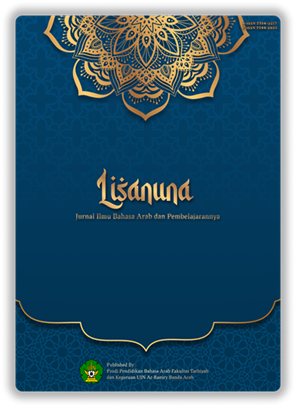TEORI BEHAVIORIS-STRUKTURALIS DAN PENERAPANNYA DALAM PEMBELAJARAN BAHASA ARAB
DOI:
https://doi.org/10.22373/ls.v12i1.12907Keywords:
Arabic learning, behaviorist-structural, linguistics.Abstract
Behaviorist-Structural theory is one of the important theories in language learning. This theory is a meeting between behavioral theory in psychology and structuralist theory in linguistics. The combination of these two theories not only creates new principles and views, but also has an impact on the development of language learning, especially second languages. This study aims to describe the behavioralist-structural theory view and its application in Arabic learning. This research is a conceptual study using descriptive-qualitative method. The results of the study show that several learning models that can be applied based on the Behaviorist-Structuralist view are: 1) Repetition of speech and conversation in Arabic, 2) Practice repeating speech with replaced isim/fi'il, 3) Practice expanding sentences patterns, and 4) Exercises for manipulation of isim/fi'il sentences. According to the behavioralist-structuralist view, the teacher and the environment play a major role in the success of learning Arabic as a second language, both in the formal (school) and informal environment (home/family).
References
Adi, Habib Maulana Maslahul. “Teori Belajar Behaviorisme Albert Bandura Dan Implikasinya Dalam Pempelajaran Bahasa Arab.” Lisanuna 10, no. 1 (2020): 22–31.
Arsanti, Meilan. “Pemerolehan Bahasa Pada Anak (Kajian Psikolinguistik).” Jurnal Pendidikan Bahasa Dan Sastra Indonesia 3, no. 2 (2014): 24–47.
Asy’ari, Hasyim. “النظرية السلوكية واكتساب اللغة الأم.” Al Qodiri: Jurnal Pendidikan, Sosial Dan Keagamaan 16, no. 1 (2019): 127–40.
Kristianty, Theresia, and Karmadevi Christiaan. “Pandangan-Pandangan Teoritis Kaum Behaviorisme Tentang Pemerolehan Bahasa Pertama.” Jurnal Pendidikan Penabur 5, no. 6 (2006): 1–40.
Kusmintardjo, Mantja W. “Landasan-Landasan Pendidikan Dan Pembelajaran.” Universitas Negeri Malang, 2011.
Mahmudi, Muhammad. “Penerapan Teori Behavioristik Dalam Pembelajaran Bahasa Arab (Kajian Terhadap Pemikiran BF. Skinner).” In Prosiding Konferensi Nasional Bahasa Arab II, 429–35. Malang: Jurusan Sastra Arab Fakultas Sastra Universitas Negeri Malang, 2016. https://doi.org/2540-9417.
Miles, Matthew B., and A. Michael Huberman. Qualitative Data Analysis. 2nd ed. New York: Sage Publications, 1994.
Munir. “Pendekatan Struktural Dalam Pelajaran Bahasa Arab.” Jurnal Shaut Al-’Arabiyah 6, no. 1 (2013): 13–24.
Muradi, Ahmad. “Pemerolehan Bahasa Dalam Perspektif Psikolinguistik Dan Alquran.” Jurnal Tarbiyah : Jurnal Ilmiah Kependidikan 7, no. 2 (2018). https://doi.org/10.18592/tarbiyah.v7i2.2245.
Rizki, Restu Budiansyah. “Kajian Linguistik Modern Strukturalis Dalam Pembelajaran Bahasa Arab.” Alsina: Journal of Arabic Studies 2, no. 2 (2020): 173–88.
Saepudin. “Teori Linguistik Dan Psikologi Dalam Pembelajaran Bahasa.” AL-ISHLAH: Jurnal Pendidikan Islam 16, no. 1 (2018): 100–118. https://doi.org/10.35905/alishlah.v16i1.738.
Salamah, Siti. “Studi Ringkas Pemerolehan Bahasa Pada Anak.” Bahastra 33, no. 2 (2015): 73–82. https://doi.org/10.26555/bahastra.v33i2.2636.
Shafa. “Teori Pemerolehan Bahasa Dan Implikasinya Dalam Pembelajaran.” Jurusan Tarbiyah STAIN, 2015, 1–9.
Suci Rani Fatmawati. “Pemerolehan Bahasa Pertama Anak Menurut Tinjauan Psikolinguistik.” Lentera XVIII, no. 1 (2015): 63–75.
Sundayra, Ladycia. “Proses Akuisisi Bahasa Pada Anak : Kajian Teoretis Mutakhir.” Kibas Cenderawasih 14, no. 2 (2017): 169–78.
Syah, M Noor Sulaiman. “Challenges of Islamic Education in Muslimworld: Historical, Political, And Socio-Cultural Perspective.” QIJIS: Qudus International Journal of Islamic Studies 4, no. 1 (2016): 82–105.
Untung, Moh Slamet. “Metodologi Penelitian: Teori Dan Praktik Riset Pendidikan Dan Sosial.” Yogyakarta: Litera, 2019.
أحمد, فيروز سوباكر, and همة المحمودة. “النظرية السلوكية في تعليم اللغة.” Jurnal Lisanudhad 3, no. 2 (2016): 117–35.
الحكيم, عبد. “النظرية السلوكية البنيوية في تعليم اللغة العربية.” التدريس 5, no. 1 (2017): 1–20. https://doi.org/10.21274/tadris.2017.5.1.1-20.
العصيلي, عبد العزيز بن إبراهيم. النظرية اللغوية والنفسية. رياض: جامعة الإمام محمد بن سعود الإسلامية, 1999.
نبيلة, دلة فطري. “تصميم منهج تعليم اللغة العربية غلى أساس النظرية السلوكية البنيوية لطلبة معهد النقاية الإسلامي يومنب مدورا.” جامعة مولانا مالك إبراهيم الإسلامية الحكومية, 2016.
Downloads
Published
Issue
Section
License
1. Proposed Policy for Journals That Offer Open Access Authors who publish with this journal agree to the following terms:
1.a. Authors retain copyright and grant the journal right of first publication with the work simultaneously licensed under a Creative Commons Attribution License that allows others to share the work with an acknowledgement of the work's authorship and initial publication in this journal.
1.b. Authors are able to enter into separate, additional contractual arrangements for the non-exclusive distribution of the journal's published version of the work (e.g., post it to an institutional repository or publish it in a book), with an acknowledgement of its initial publication in this journal.
1.c. Authors are permitted and encouraged to post their work online (e.g., in institutional repositories or on their website) prior to and during the submission process, as it can lead to productive exchanges, as well as earlier and greater citation of published work (See The Effect of Open Access).
2. Proposed Policy for Journals That Offer Delayed Open Access Authors who publish with this journal agree to the following terms:
2.a. Authors retain copyright and grant the journal right of first publication, with the work [SPECIFY PERIOD OF TIME] after publication simultaneously licensed under a Creative Commons Attribution License that allows others to share the work with an acknowledgement of the work's authorship and initial publication in this journal.
2.b. Authors are able to enter into separate, additional contractual arrangements for the non-exclusive distribution of the journal's published version of the work (e.g., post it to an institutional repository or publish it in a book), with an acknowledgement of its initial publication in this journal.
2.c. Authors are permitted and encouraged to post their work online (e.g., in institutional repositories or on their website) prior to and during the submission process, as it can lead to productive exchanges, as well as earlier and greater citation of published work (See The Effect of Open Access).

